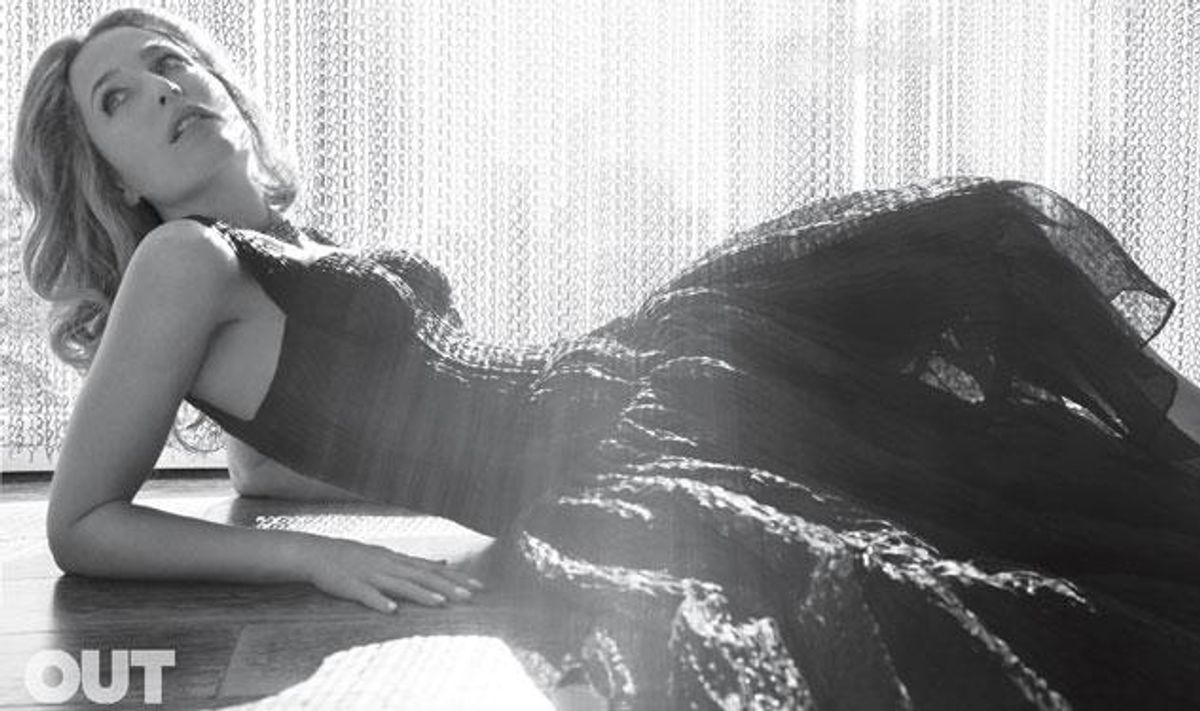
Photography by Roger Erickson
Gillian Anderson remembers being struck by a magazine article in which a woman in her late forties escapes the constraints of marriage and motherhood for a solo vacation -- "to somewhere like Italy." There, she finds herself at a dinner party among guests she does not know. "She decided that she wasn't going to mention she had kids," says Anderson in an accent that skitters pleasantly between British and American. "It was fascinating to read. It changes the energy of the conversation if people are talking about their kids -- it puts you in the room as this wildcard, and people look at you like you don't understand, and how would you know?"
Anderson, who has a 17-year-old daughter from her first marriage and two young sons with her current partner, has spent a lifetime feeling like the wildcard in the room. As an actor, she is used to projecting herself into other lives, but questions of identity color her life, too. She recalls moving from England to Michigan, when she was 11, and discovering that she was no longer part of the tribe. "Going from London to a small Republican town like Grand Rapids was quite a shock," she says. "I thought it would be a place of sunshine and happiness and candy bars." In high school, she was voted "Most Bizarre" and "Most Likely to Be Arrested." Both descriptions, says Anderson, contained a kernel of truth, "based on how I chose to look, dress, behave, you know--the relationships I was in at the time were freaking people out." Invited to elaborate, she begins to list them: "I was in a relationship with a girl for a long time when I was in high school, and then I was in a relationship with a punk rock drug addict who..."
Wait, a lesbian relationship? "Yeah, yeah, well it's... You know, I'm old enough that I can talk about that," she says, before resuming her list: "And then I was in a relationship with somebody who was way, way older than me. Everything that that kind of anarchistic attitude brings--the inappropriate behavior it leads to--was how I chose to be in the world at that time, which was, you know, not what people did."
Much of this has been written before -- how she dyed her hair purple, how she glued the school gates shut on graduation night, the drugs and alcohol -- but her lesbian romance is something new. Understandably, she is wary of making a big deal of it, precisely because it is a big deal for so many people. "If I had thought I was 100% gay, would it have been a different experience for me?" she wonders. "Would it have been a bigger deal if shame had been attached to it and all those things that become huge life-altering issues for youngsters in that situation? It's possible that my attitude around it came, on some level, from knowing that I still liked boys."
Anderson says she has had relationships with other women, but they have been the exception, not the rule. She is, of course, aware of the lesbian fan base -- in a 2007 episode of The Graham Norton Show, a popular U.K. talk show, the mischievous host invited her to read aloud from a lesbian foreign phrase book, to which she gamely responded, "Lick my clit," only to realize that Norton intended her to deliver the phrase in German. But for many of those fans, it wasn't Anderson they were responding to; it was Dana Scully, the FBI special agent she played in an oversized trench and sensible shoes on The X-Files.
It's clear that Anderson doesn't want to make more of her admission than it warrants, but it goes to the heart of the instincts that animate her life. Like the woman in that magazine article, Anderson is aware that what you choose to say about yourself, and what you leave out, has consequences. And because of her adolescence in Michigan, she is perhaps more interested in upsetting convention. It must be the ambition of any number of young actors to find themselves in one of the biggest-rated TV shows in U.S. history. For Anderson, however, The X-Files was an aberration.
"I think I always felt that I was going off track," she says. "I had a very negative opinion of television, and perhaps rightly so at the time."
In today's celebrated age of TV drama, it's easy to forget how slim the offerings were in 1997, when Anderson beat out the likes of Melrose Place's Heather Locklear and pioneer medicine woman Jane Seymour to win a Golden Globe for Best Actress in a Drama Series. But The X-Files was an anomaly that helped change the perception that TV was inferior to film. It would take The Sopranos, which first aired on HBO in 1999, to raise the bar further: Today, it often seems that television is where the real talent and creativity lies.

It's been 10 years since Anderson turned in Scully's FBI card after nine phenomenally successful seasons of The X-Files, but it's what she did next that best illuminates her tendency to swim against the tide. With Scully behind her, she took off for London in search of the kinds of roles she had always desired. She had already impressed critics with her flair for character acting in the Terence Davies film adaptation of Edith Wharton's The House of Mirth. Back in England, she promptly disappeared from Hollywood's radar (save for a brief return to The X-Files for a lackluster 2008 movie), and cycled between ambitious stage roles, such as Nora in A Doll's House, and career-defining turns in sumptuous costume dramas, including Lady Dedlock in the brilliant BBC/PBS adaptation of Dickens's Bleak House and Wallis Simpson in Any Human Heart. In Michael Winterbottom's Tristram Shandy: A Cock and Bull Story, she played a comic version of herself.
Now comes another Dickens serial, with BBC's adaptation of Great Expectations set to air stateside on PBS. Anderson stars as Miss Havisham, the bride that time forgot, consumed by loss and resentment, surrounded by her stale, mouse-eaten wedding cake and dried bouquet. It's a role freighted with precedent -- including Margaret Leighton, Anne Bancroft, and Charlotte Rampling -- but Anderson brings new emotional depth to the part.
In Britain, where it aired in January, much was made of 43-year-old Anderson's relatively young age. She says that playing the character as an older woman risks losing the pathos. An old lady in a wedding veil is a gothic crackpot; a middle-aged woman stuck in the past is tragic.
"I'm aware that there's mixed conversation about my age and about the way I chose to play her," she says. "I have a weird relationship to all that stuff. I get a little grin about it. I feel a smile coming on, and I wonder how much of that is a pleasurable 'fuck you.' "
This brings us back, in a roundabout way, to the punk spirit that possessed her as a teenager and which, she suspects, is still guiding her. "I don't think I've ever followed convention by choice," she says. "By default, maybe, but not by choice."
She has noticed a schizophrenic tendency in her roles that reflects contradictions she sees in her own life. She says she sometimes has trouble connecting the woman who walks around London "all in black--black pants and a Rick Owens jacket" with the woman who turns up for photo shoots "with blond, wavy hair and tight jeans and high makeup. It's like, What the fuck? I need to decide what's going on here before I subject the rest of the world to it. "
Given the dualities that have illuminated her personal and professional life, it makes sense that the only role Anderson has truly aspired to play is Blanche DuBois in A Streetcar Named Desire -- the ultimate vehicle to explore the way we create fantasies about the world and ourselves. "I guess there's some kind of identification there, or a thought that I have something to give," she says.
But Anderson has another play in London next spring and frets that she might be too old to play the role before the right opportunity comes along. "I feel I'm ready--I'm absolutely terrified at the prospect of it, but I do feel ready," she says, before adding that the ideal Stanley would be Ryan Gosling. "Can you imagine!?"
Last September, Anderson's younger brother died of a brain tumor at the age of 30. He was a Buddhist, and Anderson says the grace and spirit with which he approached his death has gifted her with a powerful legacy, one that has helped her resolve her own conflicting identities.
"He left me with a vigilance for the truth in my life and a conscious, active shedding of everything that feels contrary to me," she says. "There was an extraordinary period of time where we all got to be together for the last couple of weeks, and it had a sustained and profound effect on my life."
Great Expectations premieres April 1 on PBS.




















































































